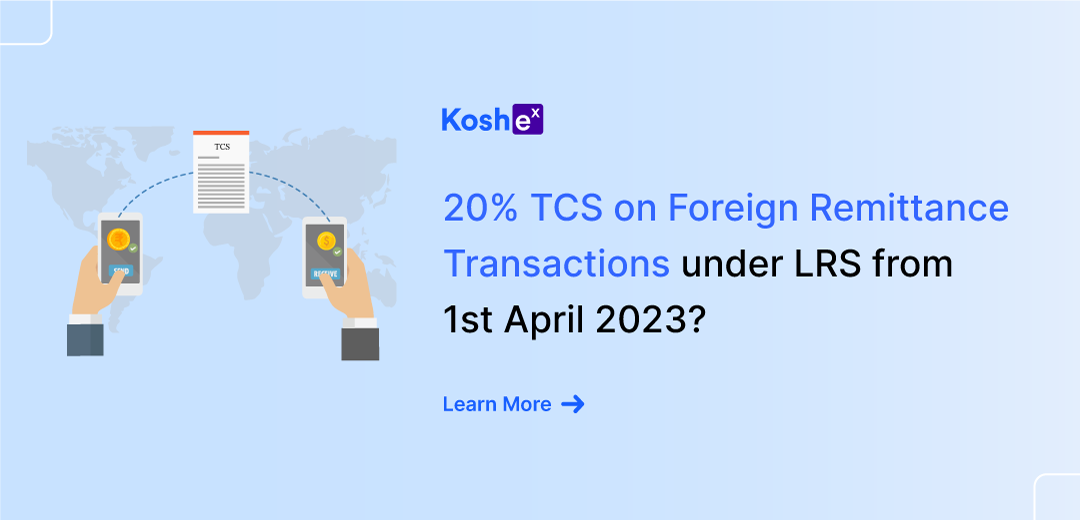Remittance refers to sending money across borders. It is crucial for many individuals who support their families or conduct business from overseas. However, recent changes in regulations require a 20% tax collected at source (TCS) on foreign remittance transactions made under the Liberalised Remittance Scheme (LRS). This article discusses the implications of this tax and its impact on senders and recipients.
For example, Ravi, who has a business abroad, wants to send Rs.10,000 home. However, due to the 20% TCS, a portion of the remittance will be deducted as tax. In this case, 20% of Rs. 10,000, which is Rs. 2,000, will be withheld as tax. As a result, the actual amount received by his family will be reduced. Therefore, Ravi needs to factor in this tax when calculating the amount he wishes to send to ensure that his home receives the intended funds after the deduction. The amount collected here will be adjusted as per the tax amount due by Ravi.
By signing up with Koshex, you can explore investment opportunities and optimize your financial strategies in light of these new regulations.
20% TCS on Foreign Remittance Transactions
The recent announcement of a 20% TCS on foreign remittance transactions has raised significant interest and concern among individuals remitting funds abroad. This move comes as part of the government’s efforts to strengthen tax compliance and monitor overseas transactions more closely. Before this proposal, remittances sent abroad exceeding Rs. 7 lakhs were subject to a TCS of 5%.
The concept of TCS involves collecting tax at the source itself, which means that the authorized dealer or bank facilitating the foreign remittance will deduct 20% of the remitted amount as tax. This tax will then be deposited with the government on behalf of the individual making the remittance.
Implementation of 20% TCS applies to various types of foreign remittance transactions conducted under the Liberalised Remittance Scheme (LRS).
While the government has introduced this tax to ensure better tax compliance, individuals remitting funds under the LRS need to understand the implications of the 20% TCS. This includes evaluating the impact on their tax liability, considering any exceptions or exemptions applicable, and complying with the necessary reporting and documentation requirements.
Overview of the Liberalised Remittance Scheme (LRS)
The Liberalised Remittance Scheme (LRS) is a framework introduced by the Reserve
Bank of India (RBI). Under the LRS, individuals can remit a specified amount of money per financial year for various purposes, including travel, education, medical treatment, and investment in foreign securities.
This scheme aims to simplify the process of outward remittances and make it more accessible for individuals. It provides individuals with the freedom to diversify their investments and engage in permissible transactions outside the country.
One of the key features of the LRS is the ease with which individuals can transfer funds abroad. The scheme allows residents to send money to foreign countries without the need for prior approval from the Reserve Bank of India (RBI) or any other regulatory authority. It provides flexibility in terms of the purpose and frequency of remittances.
Implications of the 20% TCS on Foreign Remittance Transactions
The recent introduction of a 20% TCS on foreign remittance transactions has significant implications for individuals who remit funds abroad under the Liberalised Remittance Scheme (LRS).
The 20% TCS is applicable on remittances made under the LRS for various purposes. While TCS is applicable to travel, education, medical treatment, and investment in foreign securities, certain transactions, including those for education and medical purposes, are exempt from this tax liability.
| Remittance | Current TCS Rate | Proposed TCS Rate |
| For an education loan | TCS of 0.5% is applicable on the invested amount or the aggregate of the amounts exceeding Rs. 7 lakhs | No change |
| For the purpose, other than education loan | TCS of 5% is applicable on the amount or the aggregate of the amounts in excess of Rs. 7 lakhs | No change |
| Tour package | 5% with no threshold limit | 20% with no threshold limit |
| Any other case (buying shares, debentures, or real estate) | 5% TCS is applicable on the amount or the aggregate of the amounts in excess of Rs. 7 lakhs | 20% with no threshold limit |
Implication
The introduction of the 20% TCS has both direct and indirect implications.
Direct Implication
It increases the cost of remitting funds abroad as individuals will have to allocate a higher amount to cover the tax component. This can impact the overall affordability of foreign remittances and may require individuals to revise their financial plans accordingly.
Indirect Implication
The 20% TCS also affects the flow of foreign remittances. Some individuals may reconsider their decision to remit funds abroad due to the increased tax liability. This could potentially impact sectors such as travel, education, and healthcare, which heavily rely on foreign remittances.
Conclusion
The implementation of 20% TCS on foreign remittance transactions has brought significant changes for individuals remitting funds abroad under the Liberalised Remittance Scheme (LRS). This could affect remittances for travel, sending money abroad, purchasing shares, bonds, real estate, etc.
The introduction of the 20% TCS means that a higher portion of the remitted amount will be withheld as tax, reducing the final sum received by the recipient. Senders must consider this tax when determining the amount to remit, ensuring that the intended funds are received by the recipient after the deduction.
It is important to note that certain exceptions exist for education and medical expenses. These exceptions provide relief to individuals remitting funds for these purposes from TCS up to Rs. 7 lakhs, exceeding which attracts a 5% TCS.
To navigate these implications effectively, it is important to stay informed about the tax regulations and guidelines. To explore investment opportunities and optimize your financial strategies in light of these new regulations, sign up with Koshex today!
FAQs
Q1. How does 20% TCS affect my tax liability?
Ans. 20% TCS increases your tax liability when remitting funds abroad under LRS. It means that you will have to allocate a higher amount to cover the tax component, impacting the affordability of foreign remittances.
Q2. Are there any exceptions to the 20% TCS?
Ans. Yes, there are exceptions to the 20% TCS for specific purposes. Remittances made for education expenses and medical treatment are exempt from this tax liability.
Q3. Can I claim a refund for the 20% TCS paid on foreign remittances?
Ans. Yes, you can claim a refund for the 20% TCS paid on foreign remittances if you are eligible for an exemption. Proper documentation and compliance with tax regulations are necessary to facilitate the refund process.









Leave a Comment